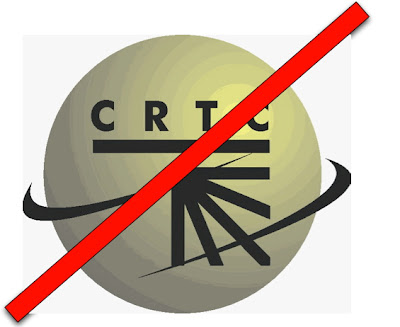While I know that many readers south of the 49th parallel will have no idea what the CRTC is, and probably many Canadians won't either, I've had it with their ridiculous protectionist practices when it comes to primetime television.
I'm an avid television watcher. Some might call me an addict though I can't hear them because I'm watching Big Bang Theory. While many of you in the US are used to having local affiliates broadcast network shows and take advantage of being able to sell and show local ads to garner their revenue, the permissions of the affiliates only extend to their own channel.
The Canadian Radio and Telecommunications Commission employs methodologies that have been prompted by the lobbying efforts of local Canadian stations and cross the line from logical to manipulative and destructive to the medium. In essence, the CRTC mandates that where a Canadian station is showing the same show as a US station that can also be seen by a viewer, the Canadian channel will "take over" the US channel for the entirety of the broadcast.
For example, I cannot watch Lost on WKBW from Buffalo (Cable 9) because at 9pm my local CTV affiliate is showing the same episode and Cable 9 becomes Cable 16 for the entire hour. Essentially, the cable providers have been ordered to redirect feeds to accommodate this protectionist regulation. Why shouldn't I have the right to watch to the show through a US feed if I want to? What harm does it do to CTV but for the chance their advertising will go down... and there's the rub.
Some of you might be thinking "what difference does it make if they're showing the same episode on both channels?" There are a few problems that are not clearly evident unless you are subject to it, but I'll try to illuminate:
- I should have the right to watch US commercials if I wish. Paying for cable gives me that right. While I admire the fact that the CRTC on one hand restricts the amount of paid ads a station can show each hour, this merely subjects me to the mind-numbing repetition of station promos every commercial break to fill in the gaps.
- Many primetime episodes from US networks are now tinkering with start/end times. Sometimes an episode runs for an extra one or two minutes (usually where a cliffhanger happens). Canadian stations don't only broadcast shows from one US network; they mix and match. If the 63 minutes broadcast of Fringe ends at 10:03 on Fox, but on Global Canada they've got an episode of Lipstick Jungle set to start at 10:00, the feed will often jump to the new show before the previous one fninished - ON BOTH CHANNELS. That means that even if I was watching Global, saw the switch, frantically switched to FOX, I'd still be watching the beginning of Lipstick Jungle instead of the end of Fringe.
- During a big television event (read: Superbowl, Oscars, etc.) US networks often debut new ad campaigns with high-end commercials that we will never get to see. I know that some of you can't understand the allure of seeing a new commercial, but trust me, it far beats seeing another promo for Corner Gas during the two minute warning of the big game.
- The Canadian uptake on HDTV has been very well implemented in some cases but annoying faulty in others. In watching the CTV-HD feed of the NFL yesterday the HD dropped out at least a dozen times down to SD for half a minute or more.
When I emailed the CRTC with this complaint earlier this year, they claimed Canadians wanted it this way and it was the law. First, if Canadians wanted to watch Canadian feeds, they could still do so. Second, laws evolve and are prone to change when people realize how wrong they are.
The CRTC has a place. The CRTC has a purpose. Its place should not be on a US channel that I pay for. Its purpose should be to offer me choice, not restrict it. If you're Canadian, go to the CRTC website, register a complaint and see how little they're willing to even discuss remedy. If you're American, be happy we don't spend billions of dollars each year on television programming, because if you wanted to watch our stuff, your government would probably be lobbied to do the same thing.





